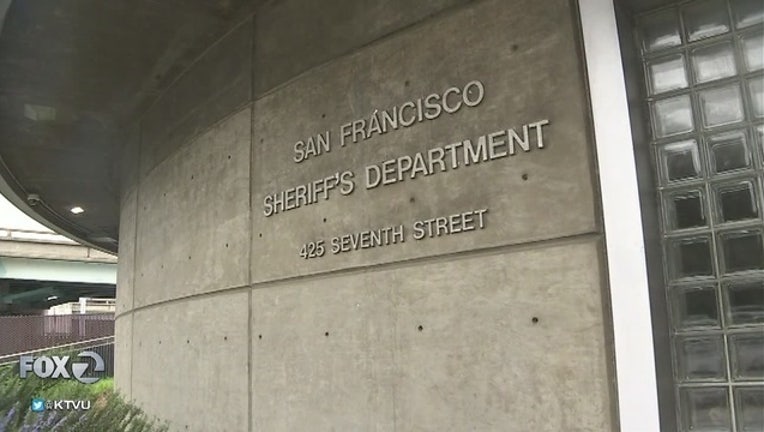San Francisco sheriff overtime on the rise, department still uses paper timesheets, audit finds

FILE ART - San Francisco Sheriff's Department
SAN FRANCISCO (KTVU) - The San Francisco auditor found overtime to be on the rise at the sheriff's department because of new bail reform mandates requiring deputies to do more work, generous comp time formulas and outdated, paper timesheets.
In a report published this month, the audit found that the sheriff's budgeted staff went down 1 percent and the total hours of work went up 13 percent -- and a proportion of those hours worked on overtime increased from 14 to slightly more than 20 percent.
Chief Audit Executive Tonia Lediju did not put an exact dollar amount on the overtime, but in response, the sheriff said she knows of the issue and would like to cut the overtime budget by half, to 10 percent.
Lediju found that a large part of the overtime is because the deputies' workload has increased, largely for two reasons: A 2018 California court ruling increasing San Francisco's use of supervised release and the need to monitor those on electronic monitoring bracelets, and requests to provide security at the expanded Zuckerberg San Francisco General Hospital.
Oakland police average $30M a year in OT; one officer racked up nearly $2.5M in 5 years
For instance, her audit found that new enrollments in electronic monitoring went up by 355 percent and people violating terms of monitoring increased 2,382 percent. The audit also found that security went up at the Department of Public Health by 42 percent.
And all this work comes at a time when the sheriff's department seems to be insufficiently staffed.
While Lediju found that the agency has enough supervisors – 76 – the auditors found the agency is short on deputies; it needs 761 but only has 585. And she said that some of the sheriff's work, at least 34 positions, could be done by non-sworn staff, which could save the department nearly $1 million.
Not only that, but the audit found that the sheriff's department still uses manual timesheets, and that the system is antiquated.
Sometimes, supervisors don't state what date the overtime was worked, which can make it appear, for example, that the employee worked overtime on the day when the timesheet was submitted, rather than the day before. This creates extra work for the payroll staff and can lead to payroll errors, the audit found.
A watchdog group found that incredible.
"Wow, it's 2019 and an agency with a $5 billion payroll still uses pen and paper for tracking OT," said Robert Fellner, executive director of Transparent California, a nonpartisan think tank that tracks public salaries. "That's nuts!!"
There were other problems with the manual timesheets, too.
The audit found that the sheriff's department does not sufficiently track and analyze special requests for security from the courts. When the courts make a special request for additional security, such as for a high-profile court case, the department maintains timesheets of the employees who worked on the special request. However, supervisors do not analyze the timesheet data to determine how many special requests it has received, how often they are received, or how many employees work on them, the audit found.
Compounding these challenges is the fact that the city's "People & Pay" system does not allow the sheriff to accurately monitor employees' work hours when their shifts span two days, the audit found. The system, in its current configuration, shows how many hours were worked on a given day, but not whether those hours were the continuation of a shift that started the previous day or one of two separate shifts. So if an employee works 16 consecutive hours spanning two days, the system only captures the hours worked on each day.
Sheriff's deputies make hundreds of thousands of dollar in OT
The sheriff welcomed the audit with open arms.
Many of these findings "validate the frustrations my department has experienced over the last five years," Sheriff Vicki Hennessy wrote in response to the audit. "While we make progress, we find ourselves playing a perpetual game of catch-up."
Hennessy wrote that she has brought up this issue for several years asking for more employees and better software. "Unfortunately, our previous requests for help have been refused." An email to the mayor's office this week went unreturned.
The sheriff noted that overtime now makes up 22 percent of the personnel costs, when it should be no more than 10 percent. She either concurred, or partially concurred with the auditor's 19 recommendations.
Another fact that stood out to Transparent California, and was not specifically addressed by the sheriff in her response, is that the department has the same overtime system as Oakland, where officers can accrue 1.5 hours of "comp time" for every hour of overtime worked.
When a deputy cashes in that comp time and isn't working, colleagues have to work overtime to fill the gap. That creates a cascade of additional overtime pay, Fellner said. For example, 10 hours of overtime creates 15 hours of comp time, which some other officer has to work.
"It's a complete giveaway," Fellner said. "It's a remarkable scam."
In a phone interview, Lediju said that this type of comp time is not unheard of and something that would have to be renegotiated with the sheriff's union if it were to change.
According to Transparent California's analysis of salaries based on Public Records Requests, the top five paid people in San Francisco were all sheriff's deputies. The deputies earned between $250,000 to $300,000 in 2018 in overtime, bringing their total pay and benefits to anywhere between $450,000 to $490,000 the data shows.

